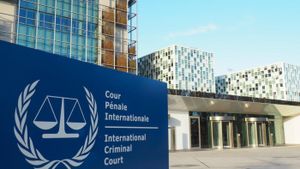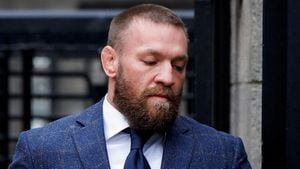Recent developments have paved the way for President-elect Donald Trump as the sentencing related to his infamous hush money case has been delayed indefinitely by Justice Juan Merchan of the New York State Supreme Court. Initially set for November 26, this latest chapter is but another twist in the long saga of legal challenges Trump faces as he prepares for another term.
The hush money case, which revolves around payments made to adult film actress Stormy Daniels, reached its climax earlier this year when Trump was convicted of 34 felony counts for falsifying business records. The intention behind these payments was to prevent potentially damaging information about his personal life from surfacing during the tumultuous 2016 presidential campaign. Daniels was allegedly paid $130,000 through Trump's then-lawyer Michael Cohen, to remain silent about their past relationship.
Friday's ruling marked another significant moment for Trump. Following requests from both the prosecution and defense, Judge Merchan placed the sentencing on hold, effectively siding with Trump's lawyers who argue for the dismissal of the case. They contend the trial and its outcomes should not disrupt the president-elect's ability to transition back to the presidency—a transition they assert is dictated by the federal Constitution and the Presidential Transition Act.
Justice Merchan did not set another date for sentencing, choosing instead to allow both sides until December 9 to submit their motions and responses. Meanwhile, Trump's legal team is pushing for immediate dismissal, claiming the case unjustly threatens to undermine the legitimacy of his presidency.
Prosecutors, on the other hand, have hinted at being open to delaying the sentencing for as long as Trump remains in office, yet they have expressed reluctance to completely terminate the case. The Manhattan District Attorney, Alvin Bragg, emphasized the need to respect the jury’s verdict and maintain the integrity of the legal process, regardless of Trump's political ambitions.
The politics surrounding this case are astir. Trump spokesperson Steven Cheung described the judge’s decision as "a decisive win for Trump," emphasizing the administration's intent to focus on the future and the American people's interests instead of engaging with what they label as baseless legal attacks.
This story doesn't just reflect Trump's rocky relationship with the judicial system; it brings to light broader questions of accountability and the intersection of politics and law. Critics have pointed out the unprecedented nature of Trump's situation—from being the first former president to be convicted of a crime to facing charges from multiple distinct legal proceedings simultaneously—all occurring as he seeks to reclaim the presidency following his 2024 election victory.
Adding complexity to the situation is Trump's history of alleged misconduct, which includes instances of alleged "catch and kill" tactics employed to silence negative press with financial incentives. The broader narrative also encompasses Trump's claims of presidential immunity, which hinge upon recent Supreme Court rulings affirming this protection for acts undertaken during official duties.
Looking back at the events leading to the hush money fiasco, it's clear this case is not just about the legal consequences Trump faces. It's about restoring his image in the eyes of his supporters who fervently support him through all tribulations.
Now, with the case delayed, all eyes are on the future motions and the responses from both sides. December is poised to be yet another pivotal month as the legal battles continue against the backdrop of Trump's political comeback. The stakes are high not just for Trump, but also for the standard of accountability for those holding the highest office.
This drama isn't just confined to courtrooms; it extends to public opinion where Trump's supporters express unwavering loyalty, even as the legal proceedings throw new challenges and uncertainties. For many, this case is emblematic of larger political struggles and the question of how leaders, including presidents, should be held to account when their actions cross legal boundaries.
Whether the hush money case might fade away or resurface as frontline issues as Trump assumes the presidency once again remains to be seen. Yet, this delay creates space for Trump’s narrative, positioning him as enduring yet again against what he and his allies frame as politically motivated legal challenges.
The question of whether justice can truly be served—a matter of legal interpretations, political maneuvering, and media portrayal—will remain a hot topic as the nation moves forward. The intersection of Trump's presidency with judicial outcomes raises complex questions about governance and legality, forming the crucible of debates sure to linger well beyond the courtroom walls.
For now, the delay seems like another strategic move by Trump, allowing him to focus on his aspirations for the White House, giving him the space to rally support from his base as the nation approaches another significant electoral phase. The echo of legal battles will undoubtedly accompany him, shaping perceptions as he navigates the charged waters of American politics.



